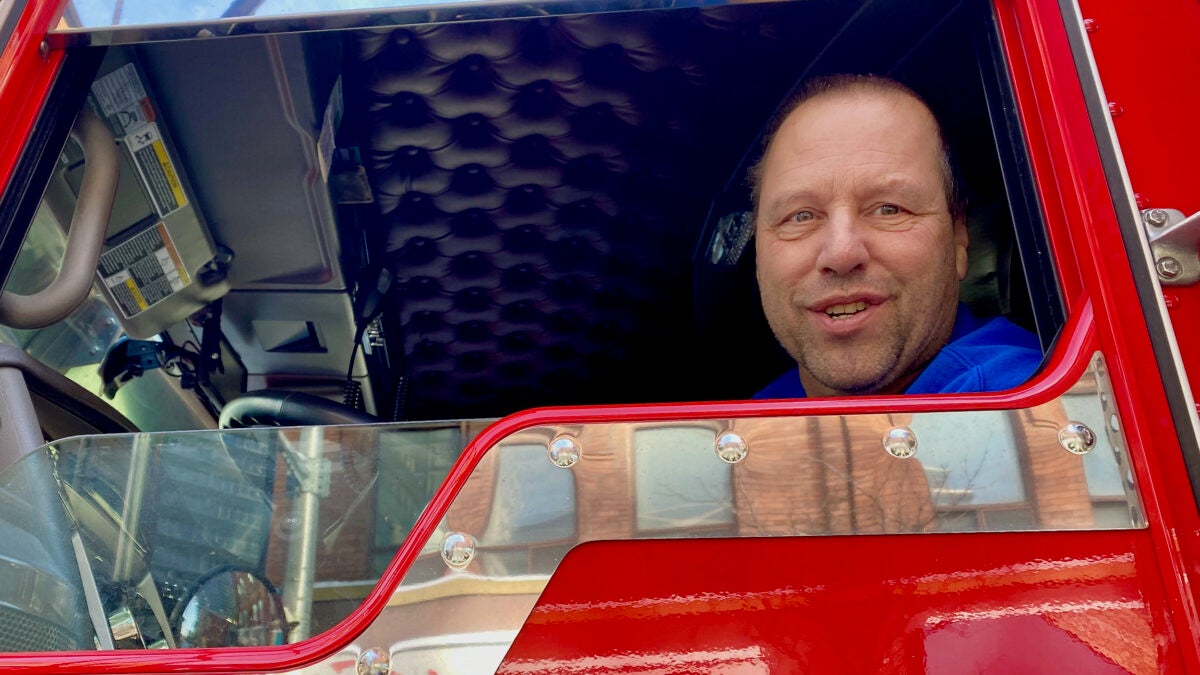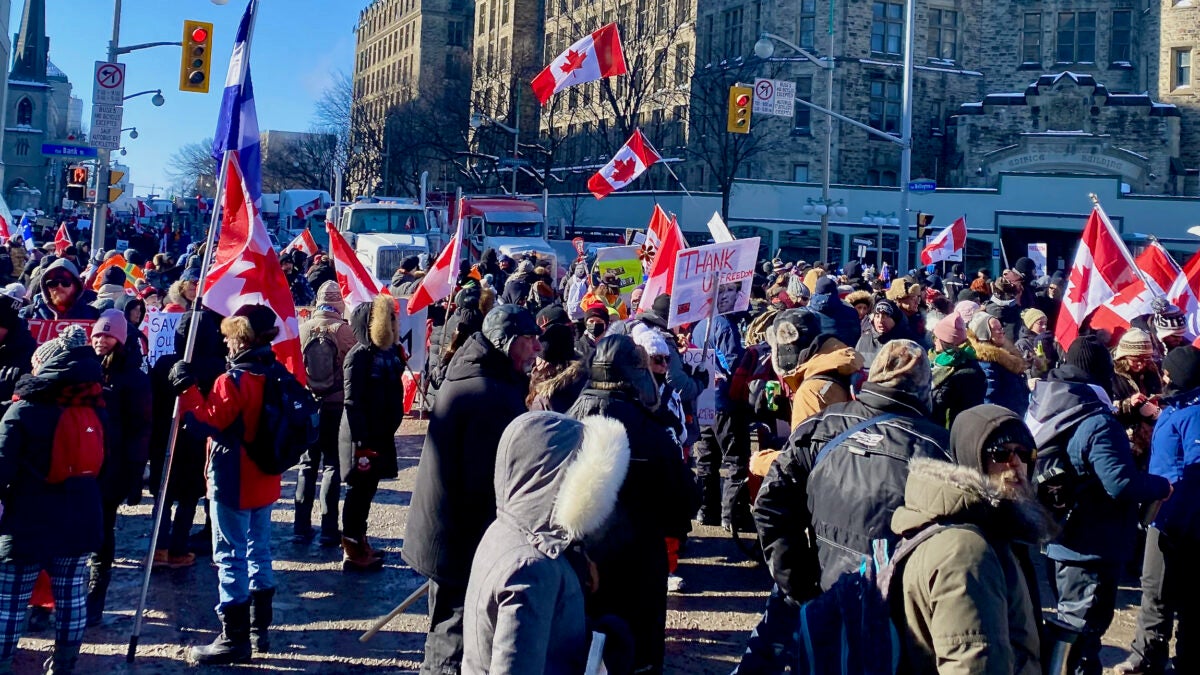OTTAWA, Ontario — Indiana trucker Brian Gregg peered through the windshield of his red and black Kenworth on Monday afternoon with a sneer as he pointed to the Dodge Ram parked in the middle of an intersection. The pickup had arrived that morning, long after most of the commercial trucks from the Freedom Convoy poured into the Canadian capital, with a sign mounted in the back in French. Translated it read, “Together and United: Freedom.”
Not long after, an ambulance with lights and sirens going had to wait for the truck to move out of the way.
“That’s bullshit,” said Gregg, an owner-operator from the Indianapolis area. “No, they don’t belong here. They’re just here stirring up shit.”
As a driver who isn’t vaccinated against COVID-19 — and has no plans to change that — Gregg came to protest the mandates imposed by the Canadian and U.S. governments on cross-border truckers. Gregg, one of the few U.S. truckers who could be spotted, slipped into Canada just before the country’s vaccination restrictions took effect.
The scope of the protest itself has moved far beyond the grievances of unvaccinated cross-border truckers demanding that Canada and the U.S. drop their vaccine mandates at the border. The protesters’ grievances now include a basket of COVID-related measures — and for some a change in government.
While Gregg vowed to stay until the mandates were lifted, his patience was wearing thin with what he called the numerous “jackasses” in large pickup trucks joining the protest.
A few blocks over, John Doppenberg, an owner-operator from Niagara-on-the-Lake, Ontario, welcomed the support of non-truckers and blamed the media for focusing on the actions of a few “drunken idiots.”
“You see all the lifted pickup trucks? These are the guys who get shit done,” Doppenberg said. “And they know their jobs are on the line if they haven’t lost them already. That’s who’s here. Yeah, you’re messing with the wrong crowd.”
Some protesters ‘need to go the hell back home,’ driver says

Truckers themselves have also been outnumbered by an array of protesters representing a mishmash of interests and political affiliations, including extremists and secessionists. While the vast majority of protesters have been focusing on issues related to COVID restrictions and displeasure with the government of Justin Trudeau, the convoy has attracted support from far-right activists with white nationalist and racist views — though organizers have sought to distance themselves from them and said displays of hate will not be tolerated.
While the protests have been largely peaceful, a series of troubling incidents tied to supporters, including displays of Nazi flags, has shifted much of the attention away from the underlying grievances.
“If they want to do the same as us, it’s fine,” Gregg said. “But if they’re going to do shit to make us look bad, it’s not fine. They need to go the hell back home and mind their own business.”
Meanwhile, officials are growing increasingly frustrated with the protesters and the behavior by some of them and the trucks clogging up significant portions of downtown Ottawa. On Wednesday, Ottawa’s police chief said he couldn’t rule out requesting assistance from the military — something Trudeau has rejected.
While the truckers interviewed by FreightWaves during the protest — most of them are owner-operators — voiced steadfast support for the continued protest, some expressed reservations about the people who have come out to support them and frustrations because the mainstream media focused on negative incidents.
Gregg said he hadn’t been aware of the series of incidents involving convoy supporters that had made headlines in Canadian media a day earlier. They included displays of Nazi flags, protesters dancing on the Tomb of the Unknown Soldier and the appropriating the statue of Canadian national hero Terry Fox, and allegations from a homeless shelter that protesters had harassed staff.
“We were supposed to be peaceful, but then you always have assholes,” Gregg said.
Trucker baffled by the weirdos, troubled by the extremists
Many of the trucks taking part in the protest have parked in a tight formation along Wellington Street, home to Canada’s House of Commons. With temperatures dropping below zero — particularly in the evenings, many of the truckers stayed inside their rigs to keep warm — frequently honking their horns. Protesters walked along the rows to trucks — some handing out food, stopping to offer thanks and stopping for selfies.
While the crowds included families and those jubilantly waving Canadian flags, there was also a significant presence of more fringe elements. Some appeared harmless, including the man who passed DeAndre Mahadeo’s rig wearing only a thong bikini and cape.
“That’s the true definition of freezing your balls off,” Mahadeo said, chuckling.
But there were others whom Mahadeo found troubling, including the guy holding an effigy of Trudeau with a noose around its neck.
“Oh man, that’s not nice,” he said. “You know actually what he’s trying to get across.”
Mahadeo is a dual U.S.-Canadian citizen originally from Guyana. His truck is based in Jacksonville, Florida, where he has family, but he maintains a home with his wife in Ontario. Mahadeo, like just about every protester and trucker, is no fan of Trudeau and his Liberal Party. A gun owner, Mahadeo said he voted against the Liberals in the last federal election because his platform included more firearms regulation. But he said some aggressive messaging against Trudeau went too far.
When Mahadeo joined the convoy from the Toronto suburb of Vaughan last week, he seemed buoyant, declaring, “We’re here to join a movement.” The trucker is fully vaccinated against COVID-19, but he said the vaccine mandates amount to government overreach.
As he sat in his truck in Ottawa, Mahadeo’s enthusiasm seemed far more muted. While he remained firm on the need to protest the mandates, some supporters flocking the cause gave him misgivings. Near his truck were numerous supporters of the People’s Party of Canada, a small far-right party with a platform that calls for Canada to dramatically reduce the number of immigrants allowed into the country.
Watch now: What’s actually happening with the Freedom Convoy?
“I feel out of place because I’m an immigrant here,” he said.
Mahadeo also pointed out that he was one of the few drivers of colors in attendance — something that weighed on him. While he said no one has said anything ill toward him, he is well aware that there are supporters who harbor racist views.
“I know what they stand for and I am aware of the color of my skin and know how to keep my limits because I don’t want an altercation with anyone,” he said. “So I try to be like, I’m here and I’m neutral. We’re all here for the same reason.”
For Mahadeo, the issues at stake are far bigger: “You don’t force things on people.”
“I’m here because of the government overstretching, overreaching and pushing everyone to get the vaccine,” he said.
Vaccine mandate messaged ‘drowned out by all the other stuff’

But Mahadeo said the original message about truckers and the cross-border vaccine mandates may have been lost. Nevertheless, he said the protest still has value in fueling a larger conversation about how Canada should handle the pandemic.
“It did get drowned out by all the other stuff that’s going on,” he said. “The whole thing started up and then a few things got tacked on, like that all the mandates that must be gone. But I don’t see that happening anytime soon. But at some point, they have to go because we’ve gone like this for two years.”
In the days leading up to the convoy, organizers boasted that 50,000 trucks would be coming. Police haven’t released official figures, but the actual number appeared to be in the hundreds. Even so, the protest has managed to overwhelm downtown Ottawa and put the truckers and the others there at the center of a national conversation.
Before the convoy picked up steam, the conversation in the national media and among politicians surrounding the border mandates and unvaccinated truckers focused on the risk to the supply chain. So far the worst fears about a drop in cross-border trucking capacity of 10 to 15% do not appear to have been realized. Meanwhile, the Canadian Trucking Alliance as well as major carriers have condemned the protests, after raising alarm about the risks to trucking capacity.
What started as a discussion about whether the risks to the supply chain outweigh any potential benefit to public health by mandating vaccines at the border has moved to a simple question: what to do about the protest and others that have popped up. Truckers blocked the border in Coutts, Alberta, for days, while another protest may be coming to Toronto on Saturday.
Many of the drivers interviewed by FreightWaves vowed to remain for weeks or even months. John Krahn, an owner-operator from Manitoba, declared, “I have enough food to last a month!”
Gregg, the trucker from Indiana, had no plans to leave anytime soon, but conceded he has a limit.
“I’m going to need to shower someday,” he said.







